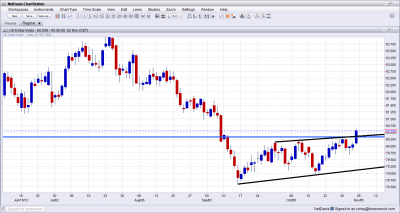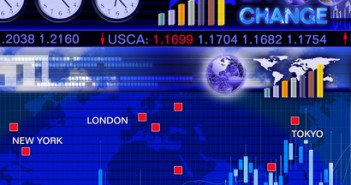The US Presidential Elections are just around the corner, and perhaps the markets do not see it as a “tight race”, “too close to call” or “tossup” anymore, but rather assume that Barack Obama will be re-elected.
Update: Obama is re-elected – EUR/USD jumps towards resistance – will the dollar continue weakening, or could this turn around?
Analyzing the reaction to the Non-Farm Payrolls indicates that Obama’s lead in key swing states could be already translated into a victory on November 6th.
Election Day Update: Obama Set to Win, EUR/USD Slides
And here is the US Election Results Timetable
The headlines of the Non-Farm Payrolls report were OK, but not amazing: the US reported a gain of 171K jobs in October, better than expected. However, the unemployment rate rose from 7.8% to 7.9%. While this was exactly as economists predicted, a rise in the unemployment rate on the eve of close elections isn’t supportive of the incumbent.
Nevertheless, the report didn’t supply enough ammunition to help challenger Mitt Romney either. For supporters of Romney, the US economy is still struggling, and Obama failed to bring a recovery, as the high unemployment rate shows. For supporters of Obama, their candidate did a good job in terrible conditions, as the consistent job gains show.
This report had “a bit for everyone”, and isn’t likely to affect voting.
So, the situation in the polls remains unchanged: Obama continues to lead in Ohio and a few other swing states and has a chance to win 290 or 303 seats in the electoral college, more than 270 needed, and with a nice margin. FiveThirtyEight even projects 85% chance of winning for Obama and explains that for Romney to win, state polls must be statistically biased.
How did markets react?
Looking only at currencies, the dollar’s rise on a positive report makes sense. The details of the report were indeed encouraging (a higher participation rate and significant revisions). However, the reaction is usually different in too many cases: positive US indicators often increase the appetite for risk, pushing the “safe haven” dollar and yen lower, while “risk” currencies such as the euro and the Australian dollar rise.
This is the US Dollar Index:

US Dollar Index Breaks Higher – Click image to enlarge
Note that the index broke above the recent range and above uptrend resistance. It’s also important to remember that the index leans towards EUR/USD. EUR/USD also fell, but didn’t fall out of the 1.28-1.3170 range. So, the dollar’s strength is a wider phenomenon.
In addition, currencies don’t live in a world of their own: markets are correlated. And this case, the stronger dollar was accompanied with a slide in US stock markets: S&P fell by 0.94%, Nasdaq by 1.26% and Dow Jones by 1.05%. The prices of gold and oil also dropped by over 2% each.
This is a classic “risk off” reaction. What could cause an aversion of risk? A victory for Obama. Assuming there is no change in the composition of Congress, it will be quite hard for Obama and the Republicans in the House to work on a deal regarding the fiscal cliff. This is what we’ve seen in the debt ceiling debacle, that led to the historic credit rating downgrade.
A victory for Obama is seen as a less favorable outcome for resolving “the cliff”. The market reaction seems to show that markets see report as strengthening Obama’s chances, or at least not damaging them), and that could explain the negative reaction.
So, in case of a victory for Obama on November 6th, will market reaction be muted? No. This is still a major event and the outcome is never 100% certain. Volatility is still expected to be high. However, there is a better chance to see stronger movements if Romney wins, as this would be more of a surprise at this moment.
Regarding the popular vote, this seems like a real tossup, with quite a few national polls showing an advantage of 1% or less to either candidate, well below the statistical margins of error in the polls. A victory for Obama in the electoral college combined with Romney winning the popular vote could certainly complicate the resolution regarding the fiscal cliff, as each side will likely stick to its stance.
Further reading:
- How to Trade the US Presidential Elections with EUR/USD
- Additional trade idea: Sell EUR/USD on Obama Win, Buy AUD/USD on Romney Win
- 5 Reasons Why Greece Could Leave the Euro-Zone After the US Elections
